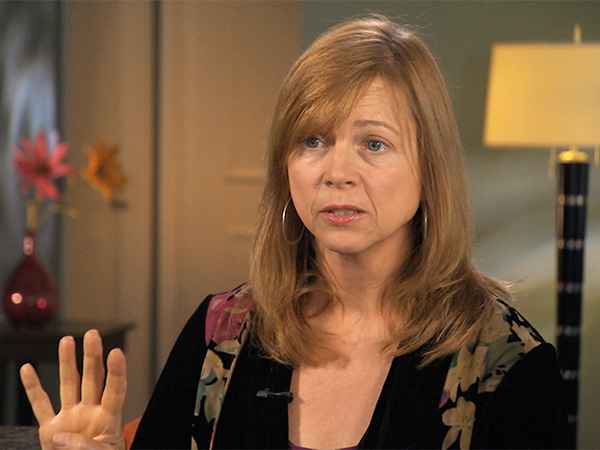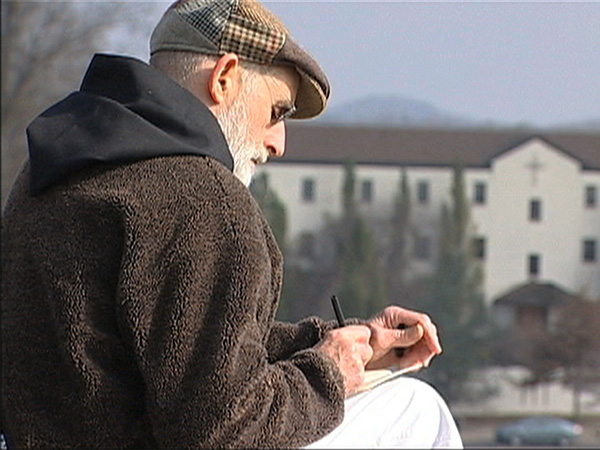 JUDY VALENTE, correspondent: In my years reporting for Religion & Ethics, I interviewed many people who not only had compelling stories to tell, but ended up deeply touching my own life. One of those unforgettable people lived in tiny Pine Apple, Alabama, a place so poor many residents still get their water from outdoor spigots. Dr. Roseanne Cook cared for the poorest of Pine Apple’s poor. Not known to most of her patients, she also happens to be a Sister of St. Joseph, a Catholic nun. She told one story I will never forget, about being robbed on a secluded road.
JUDY VALENTE, correspondent: In my years reporting for Religion & Ethics, I interviewed many people who not only had compelling stories to tell, but ended up deeply touching my own life. One of those unforgettable people lived in tiny Pine Apple, Alabama, a place so poor many residents still get their water from outdoor spigots. Dr. Roseanne Cook cared for the poorest of Pine Apple’s poor. Not known to most of her patients, she also happens to be a Sister of St. Joseph, a Catholic nun. She told one story I will never forget, about being robbed on a secluded road.
DR. ROSEANNE COOK: Threw me in the trunk here and said, “You’re dead,” and started shooting.
VALENTE: And amazingly they all missed you.
DR. COOK: I take that as an act of God that I’m here to talk about it.
 VALENTE: A story about the efforts by churches to address the spread of AIDs among young African Americans brought me to the Mississippi Delta, where I met another courageous doctor from Africa who was trying to make a difference in this country.
VALENTE: A story about the efforts by churches to address the spread of AIDs among young African Americans brought me to the Mississippi Delta, where I met another courageous doctor from Africa who was trying to make a difference in this country.
DR. HAMZA BRIMAH (AIDS Specialist): The exchange of sex is often the only essential that, unfortunately, some younger women are left with in order to be able to obtain some money for, you know, the daily essentials of living.
VALENTE: Several months after our broadcast I learned that Dr. Brimah committed suicide, the result, his friends said, of the emotional toll he faced confronting daily devastating poverty, suffering, and death in the Delta.
There were many uplifting stories, too. In 2003, I got to sit next to the piano at the home of one of my favorite composers, Jerry Herman.
 JERRY HERMAN (singing): "You give that old mint julep a kick, Mame ..." The characters I choose to write about are all optimistic, life-affirming people.
JERRY HERMAN (singing): "You give that old mint julep a kick, Mame ..." The characters I choose to write about are all optimistic, life-affirming people.
VALENTE: A few years later, I profiled another extraordinary musician, singer-songwriter Carrie Newcomer, whose Quaker beliefs infuse her humanitarian work around the world, as well as the often spiritual lyrics of her folk songs.
CARRIE NEWCOMER: I do use spiritual language sometimes in my work, but I do it very carefully. In a lot of contemporary Christian music you get eight crayons to paint with. That’s all you get. But I’m kind of like a 48-crayon kind of gal theologically.”
VALENTE: Perhaps the most memorable person I interviewed was the insouciant Trappist monk, Brother Paul Quenon from the Abbey of Gethsemani in Kentucky.
BROTHER PAUL: I think the purpose of the monastic life in the modern world is to show that we don’t need a purpose. The purpose of life is life, and you are to be just to be. Everybody measures their importance by how useful they are. That’s not it. That’s not what life is.
VALENTE: The famous monk and writer Thomas Merton encouraged Brother Paul to write poetry. Brother Paul was at work on his fourth  poetry collection when we met. He told us he writes a three-line poem, a Japanese haiku, every day as part of his meditation practice. After that interview, Brother Paul and I began exchanging a haiku a day. We did this for two years.
poetry collection when we met. He told us he writes a three-line poem, a Japanese haiku, every day as part of his meditation practice. After that interview, Brother Paul and I began exchanging a haiku a day. We did this for two years.
BROTHER PAUL (reading haiku): “Above dim snow fields / lone light of Venus, lone wail of goose / pleading for spring”
VALENTE: He and I eventually collected our haiku and several short reflections we wrote to go with them into a book called The Art of Pausing: Meditations for the Overworked and Overwhelmed.
I remember him and so many of the others I’ve interviewed with great fondness. I’m Judy Valente.

 JUDY VALENTE, correspondent: In my years reporting for Religion & Ethics, I interviewed many people who not only had compelling stories to tell, but ended up deeply touching my own life. One of those unforgettable people lived in tiny Pine Apple, Alabama, a place so poor many residents still get their water from outdoor spigots.
JUDY VALENTE, correspondent: In my years reporting for Religion & Ethics, I interviewed many people who not only had compelling stories to tell, but ended up deeply touching my own life. One of those unforgettable people lived in tiny Pine Apple, Alabama, a place so poor many residents still get their water from outdoor spigots.  VALENTE: A story about the efforts by churches to address the spread of AIDs among young
VALENTE: A story about the efforts by churches to address the spread of AIDs among young  JERRY HERMAN (singing): "You give that old mint julep a kick, Mame ..." The characters I choose to write about are all optimistic, life-affirming people.
JERRY HERMAN (singing): "You give that old mint julep a kick, Mame ..." The characters I choose to write about are all optimistic, life-affirming people. poetry collection when we met. He told us he writes a three-line poem, a Japanese haiku, every day as part of his meditation practice. After that interview, Brother Paul and I began exchanging a haiku a day. We did this for two years.
poetry collection when we met. He told us he writes a three-line poem, a Japanese haiku, every day as part of his meditation practice. After that interview, Brother Paul and I began exchanging a haiku a day. We did this for two years.




